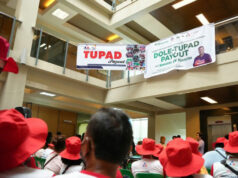THE TAX preparation lobby said it supports the President’s line-item veto of five tax perks in first package of the tax reform law, but pressed the government to pursue more reforms.
Lawyer Maria Lourdes P. Lim, president of the Tax Management Association of the Philippines (TMAP) said that the line-item vetoes issued for Republic Act No. 10963 or the Tax Reform for Acceleration and Inclusion Act (TRAIN), are expected to make the tax system more fair and equitable.
However, she said that the veto on reduced income tax of employees in regional operating headquarters (ROHQ) may need a repealing clause to effectively implement the measure.
“The effect of vetoing the proposed amendment in the enrolled bill means there is no amendment of the existing provision of the law, in effect, (leaving matters at) status quo,” she said via e-mail.
“While we laud the intention premised on fairness and equity, a process of amendment still needs to be followed. The President cannot just automatically remove the affected employees’ entitlement to the preferential rate as he is not the legislature. To effect the intention, Section 25 (C), (D) and (E) of the Tax Code needs to be specifically amended removing such incentive,” Ms. Lim added.
President Rodrigo R. Duterte in his veto message disallowed ROHQ employees from enjoying a 15% special tax rate, and instead put them in the regular tax schedule, putting them at par with non-alien resident taxpayers to promote fairness in the tax system for individuals performing similar work.
Ms. Lim also noted that despite the veto on value-added tax (VAT) zero-rating of sales of goods/services to entities in separate customs territories and outside tourism enterprise zones, it does not simplify the refund system.
“Under the enrolled bill, it is only when an effective VAT refund system is in place will the sale to the affected entities be subject to 12% VAT. But why do they need to go through the roundabout process of refund, i.e. suppliers will pass on the 12% VAT which the registered enterprises can eventually refund since they are exporters whose sales are zero-rated?,” she said.
“Might as well give to them the entitlement at the onset and save on resources for both government and the exporter,” she added.
Jo-Ann Diosana, Action for Economic Reforms (AER) senior economist, meanwhile backed the veto on the earmarking of revenues from the tobacco tax hike, as it would boost health care funding.
“We welcome this line veto on the tobacco tax earmarking in TRAIN, as it is a strong indication that the President and this administration, despite the strong tobacco industry lobby, will ensure the continued allocation of 85% of the incremental revenue of tobacco taxes to universal health care,” she said in a statement.
The original proposal supposedly subjected incremental revenue from the tobacco tax hike to Republic Act No. 7171, which provides financial support to tobacco farmers.
The tax reform law increases tobacco taxes to up to P40 per cigarette pack by 2023, from P30 currently.
However, the group is still supporting further increases in tobacco taxes for the succeeding packages of the tax reform program.
“As such, we encourage the President and Congress to push for even higher tobacco taxes so that there could be more funds for health, a reduced number of smokers, and even fewer deaths associated to tobacco use,” Ms. Diosana said.
She added that the proposals of Senators Emmanuel D. Pacquiao and Joseph Victor G. Ejercito to raise tobacco taxes to P60 and P90 per pack, respectively, would generate about P40 to P70 billion more funds for the health sector, and prevent one million new smokers by 2022.
The Department of Finance has said that it would discuss the Senator’s proposed bills as it drafts its fifth tax reform package — covering health-related measures.
“This will be an even bigger gift for the Filipino people,” AER said.
Other items that the President vetoed include the exemption from the 3% percentage tax for professionals and self-employed with gross receipts not exceeding P500,000, and the exemption of petroleum products from excise tax if the products are used as inputs, feedstock or raw material. — Elijah Joseph C. Tubayan



